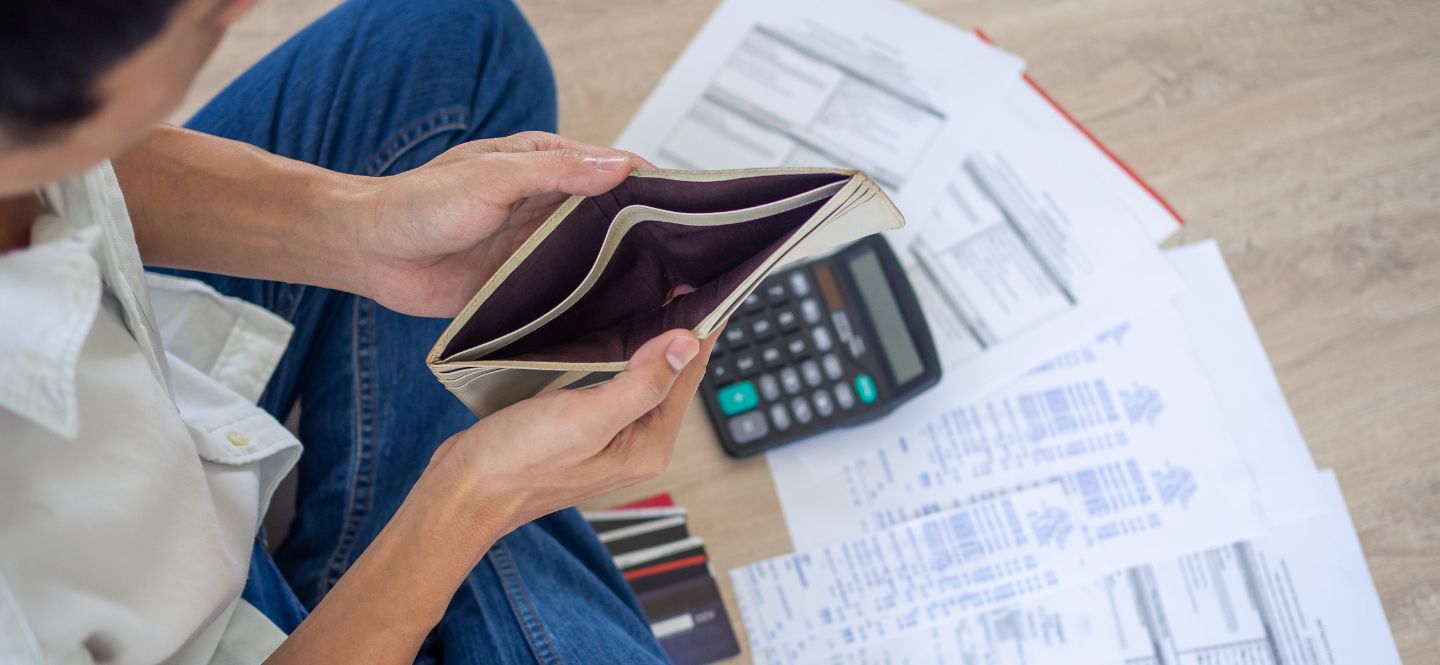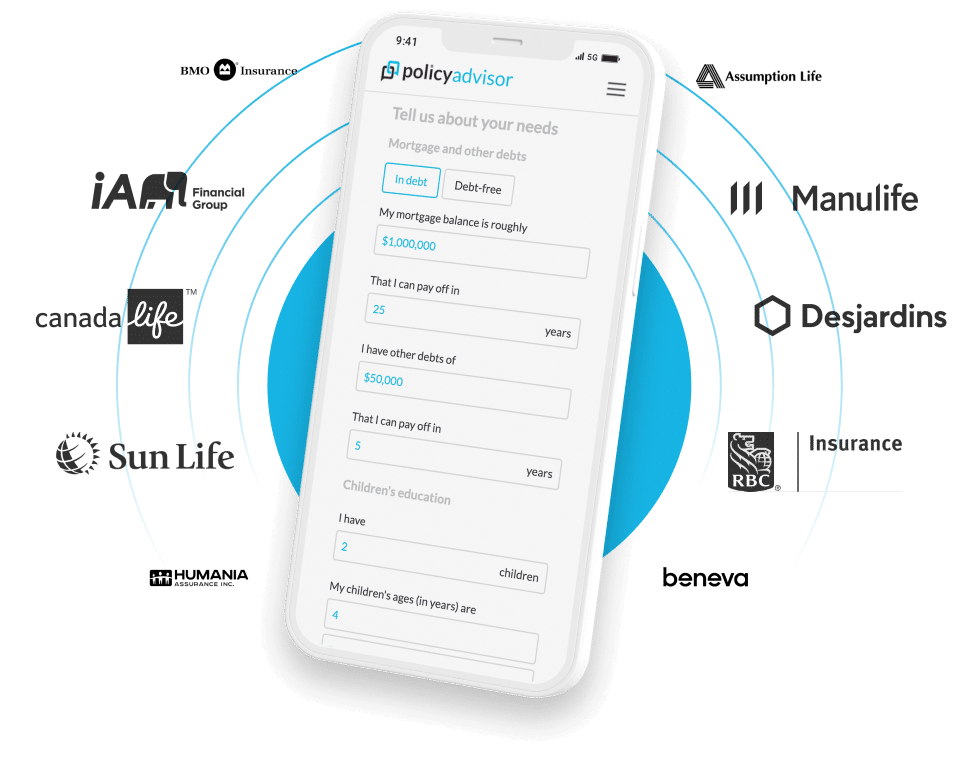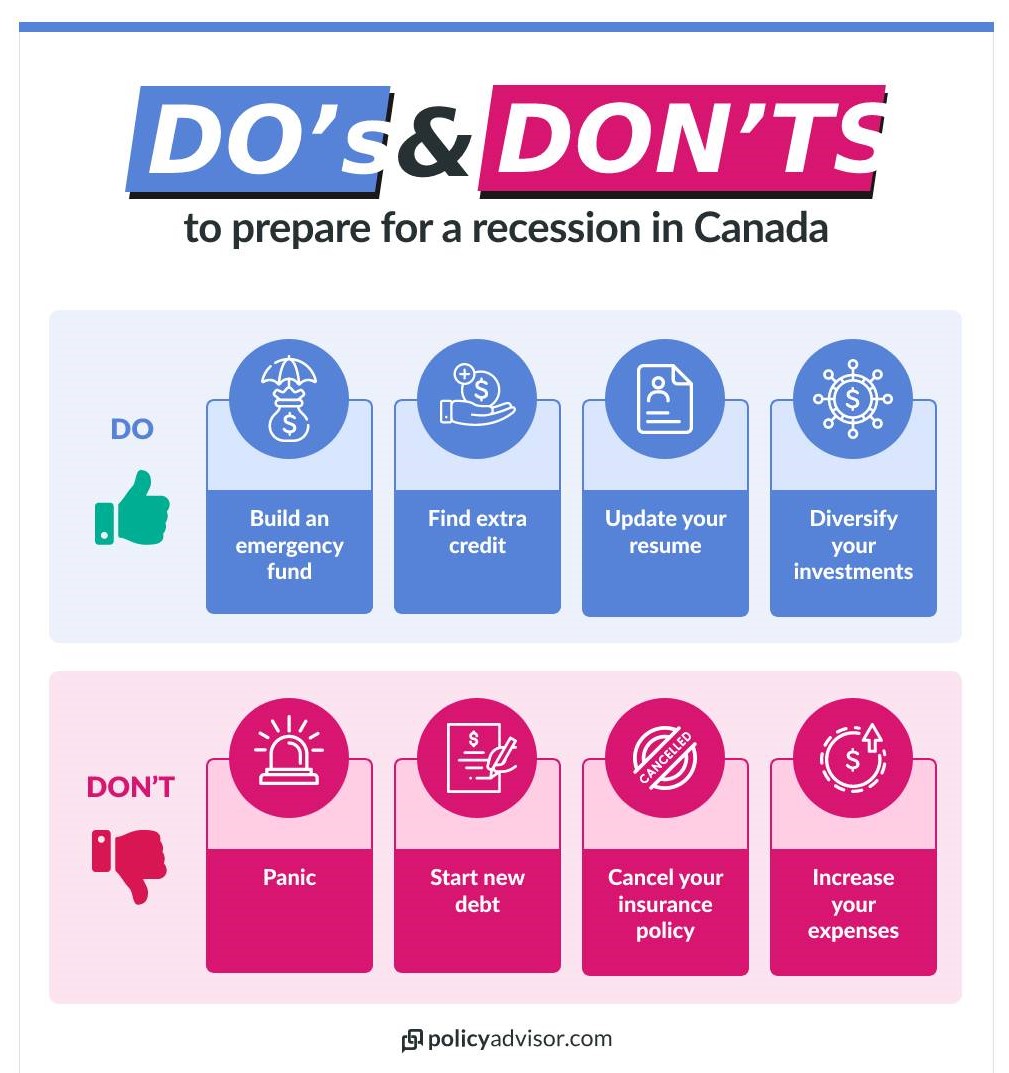
Turn on the news, and it’s hard to miss talk about a looming recession. Whether it’s “Bank of Canada” this or “inflation” that, wrapping your head around the complexities of the Canadian and global economic system is a lot of work.
At PolicyAdvisor.com, we don’t only guide you towards finding the right insurance products; we’re also all about helping Canadians with their personal finance. This includes investment decisions and how to reach your financial goals. So, in this article, we discuss what a recession is and give you some tips on how to best prepare for the tough times that come along with it.
What is a recession?
In technical terms, an economic recession refers to two consecutive quarters of declining Gross Domestic Product (GDP). Many refer to this definition, but it’s not a hard and fast rule.
In reality, two consecutive quarters of declining GDP is a signal of economic decline — not a benchmark or threshold. Other factors, such as the employment rate, consumer spending, and expert opinions, contribute to whether we’re in a recession.
We may be more inclined to call a recession once groups of economists come to a consensus. But ultimately, a recession is an adverse turn in the economy that affects employment and production.
What typically happens in a recession?
Recessions bring reduced business spending and production. As a result, we might see:
- Layoffs: Recessions bring a lot of uncertainty for businesses. Will revenues hold? Will costs go up? As a result, companies are more conservative with their expenditures and lay off employees wherever possible. You can also expect reduced hiring or hiring freezes. All of this results in a high unemployment rate, which does not bode well for the economy.
- Reduced consumer spending: Because people face job loss or potential job loss, they spend less to save for uncertainty. Businesses, especially corporations that profit from discretionary spending, see revenues decline. For example, you might skip the Friday steak dinner or an expensive pair of trousers in a recession.
- Holding off on large purchases: Similar to reduced consumer spending, individuals and families usually hold off on large purchases like a new house or car until the economy looks positive again.
- Decline in the stock market: Recessions bring uncertainty and hurt corporate balance sheets. As a result, we commonly see the stock market take a significant hit. Although these stocks will likely rebound in the long term, this depressed stock market hurts those who need to cash out to pay short-term expenses.
These are some of the expected consequences of a recession, but each downturn is unique. There’s no way to predict exactly how the next recession will pan out or its ramifications.
Additionally, recessions hit some sectors harder than others. Despite reduced spending, we still need to buy groceries and fill the gas tank. So, consumer packaged goods, gas and oil, and grocery stores continue to fare well during economic downturns.
But we might avoid travelling to Disney World or buying a new luxury sedan. Travel and luxury spending industries thus face greater hardships during this time.
How long does a recession typically last?
On average, recessions last for 11 months. But each recession is different and caused by different circumstances. It also depends on how we define recession.
For example, the pandemic-induced recession we faced in 2020 lasted three months. Afterwards, we saw enormous economic growth. In contrast, the 2008 recession lasted over 18 months.
What are the signs of recession?
The telltale signs of a recession are typically the same symptoms we see leading up to it. In particular, if the economy is experiencing declines and reductions, that could be a huge indication of a recession.
Here are some signs to look out for:
- Decline in GDP: We can define a recession as two quarters of declining GDP. So, negative GDP growth is an obvious indicator of whether we’re in a recession or not.
- Reduced employment: In poor economic times, companies hire less and layoffs occur more often. If we see a weak employment market, it’s a strong sign we’re either in or headed for a recession.
- Decline in production and retail sales: Poor economic climates mean people spend less money. As a result, retail sales at our favourite malls or online stores decline. This decline also trickles into manufacturing and industrial production, as demand for products decreases.
- Too much inflation: When we face runaway inflation, the Bank of Canada increases the interest rates to tamp it down. Increases make borrowing more expensive and can lead to a recession as it slows down business activity.
- Stock market declines: Because of uncertainty and reduced economic activity in a recession, we usually see stock prices decline.
How to prepare for a recession?
Recessions don’t have to be a dark cloud overshadowing your life. It’s easy to maintain your lifestyle and needs if you’re prepared.
But just as there are numerous ways to prepare for a recession, there are various actions you shouldn’t take in one. Here are some dos and don’ts of recessions.
6 things you should do in a time of recession:
1. Start or fortify your emergency fund
An emergency fund contains enough money to cover 3-6 months of living expenses in case you lose your income. It can also cover unexpected costs and lets you avoid debt or digging into long-term savings accounts.
This fund reduces anxieties about losing your job. You know that in such a case, you’re prepared to cover debt payments or a mortgage for an extended time. Ideally, you’ll find your next opportunity before your emergency savings run out.
Keep this money in a high-interest savings account that’s easily accessible. Make sure it’s not in stocks, bonds, or Guaranteed Investment Certificates (GIC), which are less accessible or could decline in value.
2. Find extra credit
Recessions bring layoffs and make it hard to find a new role. People aren’t hiring as much. So, it could be tough to get a new position if you’re laid off. That’s why a backup to your emergency fund might help. The ability to borrow capital at a manageable interest rate ensures you aren’t stuck if your emergency fund runs out.
Credit options can include a home equity or a regular line of credit. You could also borrow against the cash value of a whole or universal life insurance policy if you have one.
Read more about using life insurance as loan collateral and the difference between whole vs. universal life insurance.
Ultimately, you want to find something with a low-interest rate. It’s ideal not to rely on credit cards because interest rates are so high and can snowball into a lot of debt.
Additionally, don’t wait until you’re laid off to apply for these products. Credit is much easier to get when you still have a job.
3. Maintain your investments
Recessions are synonymous with a declining stock market. So, a lot of people are tempted to sell their stocks when an economic downturn is looming. But timing the market this way is usually never prudent.
Not even the top economists can predict what will happen. So, how can you know when it’s the right time to sell and the right time to get back in?
We’ve been talking about heading into a recession for a long time. If you sell your stocks and a recession never comes, you may miss out on thousands of dollars in potential gains. This might also force you to repurchase your investment at a higher price. That’s why you should stay invested through the bad and the good.
A declining stock market can cause some investors to panic. But selling due to panic is never a good idea because you act on emotions rather than logic. Take a step back and really consider whether selling is a reasonable decision.
Instead of selling everything, you should recession-proof your investments by diversifying. This means purchasing the stocks of companies in different industries and of different sizes. It also means diversifying your investment types — i.e., equities, bonds, GICs, etc.
A financial planner or investment advisor can help you prepare a proper portfolio based on your age, needs, and risk tolerance.
4. Hang onto your insurance
Similarly to keeping your investments, you’ll want to hold firm on your insurance policies during harsh economic times. It may be tempting to cancel that monthly recurring expense, or to reduce your coverage, but this is not recommended. And we’re not just saying that as an insurance brokerage.
Insurance is actually even more worthwhile during a recession. If an emergency happens, insurance can guarantee you have coverage so you don’t have to dip into your emergency funds. Plus, if you have a permanent life insurance plan with an investment component (like whole or universal), you may be able to leverage the cash value when times get particularly rough.
Read more about a life insurance policy’s cash surrender value and how you can access it during your lifetime.
If you have insurance coverage through your current employer, you may also want to consider purchasing your own policy — if at all possible — if it looks like a recession is heading our way. In the worst-case scenario, if you were to lose your job, you will also lose your insurance coverage. Having your own insurance in advance helps to make sure you’re still protected in a recession even if you were to be laid off.
On top of that, some insurance companies, such as Costco, actually waive your premiums for a period of time if you lose your job. In that case, keeping your insurance policy even during a recession is actually a win-win. Not only would you not have to pay if you lose your job, but you would still get the coverage that is especially needed during a recession.
5. Update your resume and build new skills
In addition to finances, you should prepare for less overall job security. The job market takes a major hit during times of recession. You can mitigate the chores of being laid off by updating your resume in advance.
This way, you can apply for new jobs immediately if the worst-case scenario arrives. In the best-case scenario, you won’t have to use your updated resume.
Also, consider building on your skills. New certificates or licences help puff your resume so that finding a new role is easier. Local societies or associations might offer courses to improve your skills. And numerous online platforms can offer similar courses.
Learning skills in another in-demand field helps diversify your skillset so that you can pivot careers if you’re laid off. This is especially helpful if you’re in a competitive industry with limited employment opportunities.
Ultimately, new skills never hurt your resume. Even if you don’t pivot industries, employers look favourably on any talents you can bring to the table
6. Reduce your expenses
Look at your monthly budget and see where you can reduce spending. For example, you might have unused subscriptions you could cancel. Now would be a good time to reconsider music streaming apps you may not use much, for instance.
Or, you can bring lunch to work to save a few bucks along the way. You can fortify your emergency fund with the money you save.
3 things you should not do in a recession:
1. Panic
Talk about recessions can stimulate a lot of fear. You might want to make drastic moves like selling your stocks, or you may stress about losing your job. But it’s best to remain calm. Take a deep breath and talk to a financial advisor before making significant financial commitments.
2. Take on new debt
Avoid taking on unneeded debt when you’re in a recession or heading into one. You should especially avoid high-interest debt, like credit card debt, which can quickly lead to a debt avalanche. Recessions can mean a loss in income and uncertainty.
You also want to keep credit open in case you need it to pay bills. Delay taking out loans for your business or for home renovation until after the economy recovers.
3. Create new expenses
In a recession, you want to decrease expenses. Resist purchasing new assets that require a monthly maintenance cost or a repayment plan.
How to survive a recession?
“Surviving” a recession depends on your circumstances and, sometimes, luck. If you’re well prepared with an emergency fund, you can usually make it out of an economic downturn in good shape. Even if you lose your job, your emergency fund will cover your monthly expenses for 3-6 months.
Updating your skills can also make finding a new job much more manageable. The faster you find employment again, the less you need to depend on an emergency fund or line of credit to fund your day-to-day needs.
Are we headed for a recession?
Whether or not Canadians will face a recession is the million-dollar question. Although we’ve faced strong inflation in the past few quarters, which has resulted in less consumer spending, Canada remains firm in its employment numbers.
Many argue that even if we face a recession, it is likely to be a “soft landing” — i.e., a less painful recession — due to substantial employment. But, ultimately, only time will tell whether a recession actually comes to fruition.





